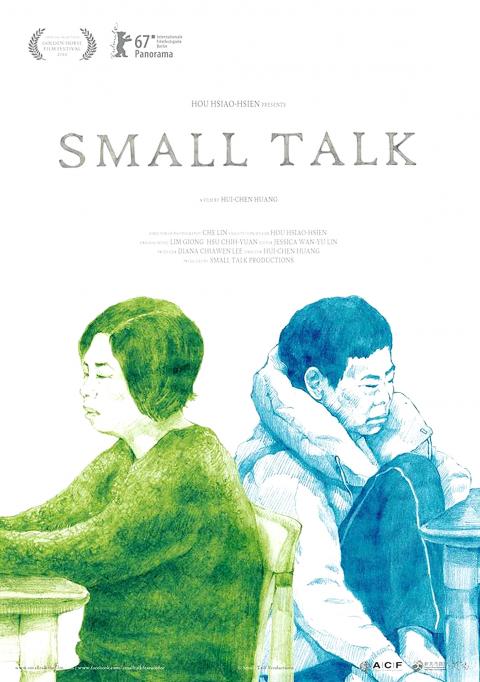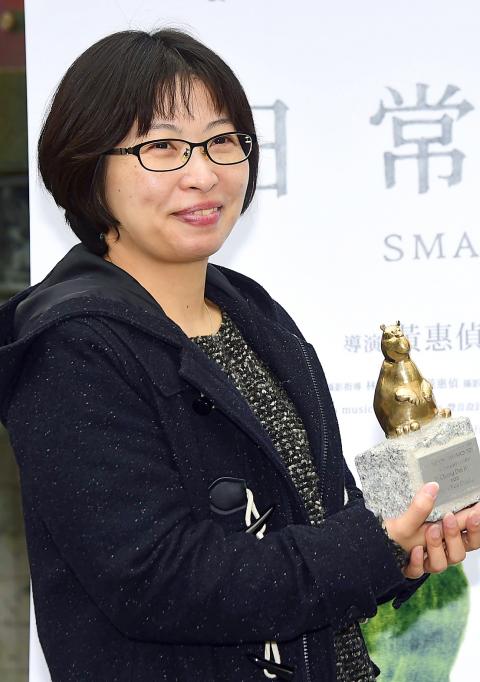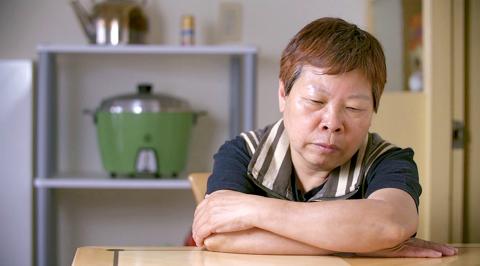As its title suggests, Small Talk (日常對話) is driven by conversation, specifically director Huang Hui-chen’s (黃惠偵) efforts to get her lesbian mother, A-nu (阿女), to open up about her past. She also speaks with other relatives and A-nu’s former lovers, asking very direct questions that clearly make some of them uncomfortable.
But what makes the film compelling is the lack of small talk. Huang reveals that even though they live under the same roof, she and her mother barely interact. A-nu cooks lunch and leaves for the day to hang out with her friends, and in one scene doesn’t even acknowledge Huang when she returns home.
With a painful past involving an arranged marriage with an abusive man, A-nu prefers to keep everything to herself. Huang admits in the film that she wouldn’t know how to approach the subject if she hadn’t picked up the camera, and through her lens she attempts to understand A-nu and release them both from the shackles of the past.

Photo courtesy of Mirror Stage Films
When they do start talking, the back-and-forth is terse, often ending up with long shots of silent weeping. There’s a suffocating tension whenever Huang appears onscreen, a stark contrast to A-nu’s carefree demeanor when she is on her own.
As such, even though the focus is A-nu, it is Huang who drives the film as the audience follows her personal journey to understand and connect with her mother. We are introduced to the story through Huang’s childhood, and we wait with her, somewhat impatiently, wondering if A-nu will reveal anything.
Huang is so much of the film. During one interview between daughter and mother, A-nu abruptly stops talking and leaves the room. The camera zooms out to reveal Huang dabbing her eyes with a tissue. With A-nu’s continued resistance to open up or talk at length, Huang’s involvement is essential for the film to be coherent.

Photo: Pan Shao-tang, Taipei Times
The documentary also gives the viewer a sense of what it was like to be a lesbian in rural Taiwan decades ago. Although homosexuality was not openly discussed, it is intimated that society was more open at the time, as A-nu brought female lovers home (who helped to care for Huang and her sister). A-nu states that she was more ashamed that her ex-husband beat her.
“There’s a lot of people like me,” she says. Instead, it is Huang who says that society made her feel for a long time that she should be ashamed of A-nu.
Small Talk is essentially the full-length cut of Huang’s short film, The Priestess Walks Alone (我和我的T媽媽), which won several local awards. Small Talk fared even better overseas, winning best documentary at the Teddy Awards, which are presented to lesbian, gay, bisexual and transgender (LGBT) productions at the Berlin International Film Festival. It was also nominated for best documentary and best editing at the Golden Horse Awards.

Photo courtesy of Mirror Stage Films
It’s unclear how long Huang had been planning this film, as there is plenty of old grainy footage. One would think that if A-nu had been unwilling to talk for that many years, she would be even more reluctant with a camera pointed at her. At one point, A-nu gets angry that Huang didn’t ask her permission before filming. But then we also have plenty of scenes from her daily life, including an intimate scene where she receives a massage from a girlfriend, that she must have agreed to be followed around.
Media interviews with Huang reveal that she started filming her mother in 1998. But it was only after Huang gave birth to her daughter in 2012 that she started pondering what it meant to be a mother, prompting her to finally breach the longstanding silence.
That’s when Huang became part of the story, though what we know about her is strictly in relation to her mother. There are enough pieces of Huang’s life mentioned that one may be left with a slew of questions after leaving the theater. She reveals a few personal secrets, but we don’t see anything from her daily life, other than taking care of her daughter. Why does she continue to live with A-nu after she got married and had a child? How did she go from not finishing elementary school and working since the age of 6 to making documentaries?
On second thought, we should applaud Huang’s courage in already revealing so much. It’s difficult enough to display something so deeply personal, and not everything needs to be laid bare.

May 11 to May 18 The original Taichung Railway Station was long thought to have been completely razed. Opening on May 15, 1905, the one-story wooden structure soon outgrew its purpose and was replaced in 1917 by a grandiose, Western-style station. During construction on the third-generation station in 2017, workers discovered the service pit for the original station’s locomotive depot. A year later, a small wooden building on site was determined by historians to be the first stationmaster’s office, built around 1908. With these findings, the Taichung Railway Station Cultural Park now boasts that it has

Wooden houses wedged between concrete, crumbling brick facades with roofs gaping to the sky, and tiled art deco buildings down narrow alleyways: Taichung Central District’s (中區) aging architecture reveals both the allure and reality of the old downtown. From Indigenous settlement to capital under Qing Dynasty rule through to Japanese colonization, Taichung’s Central District holds a long and layered history. The bygone beauty of its streets once earned it the nickname “Little Kyoto.” Since the late eighties, however, the shifting of economic and government centers westward signaled a gradual decline in the area’s evolving fortunes. With the regeneration of the once

The latest Formosa poll released at the end of last month shows confidence in President William Lai (賴清德) plunged 8.1 percent, while satisfaction with the Lai administration fared worse with a drop of 8.5 percent. Those lacking confidence in Lai jumped by 6 percent and dissatisfaction in his administration spiked up 6.7 percent. Confidence in Lai is still strong at 48.6 percent, compared to 43 percent lacking confidence — but this is his worst result overall since he took office. For the first time, dissatisfaction with his administration surpassed satisfaction, 47.3 to 47.1 percent. Though statistically a tie, for most

In February of this year the Taipei Times reported on the visit of Lienchiang County Commissioner Wang Chung-ming (王忠銘) of the Chinese Nationalist Party (KMT) and a delegation to a lantern festival in Fuzhou’s Mawei District in Fujian Province. “Today, Mawei and Matsu jointly marked the lantern festival,” Wang was quoted as saying, adding that both sides “being of one people,” is a cause for joy. Wang was passing around a common claim of officials of the People’s Republic of China (PRC) and the PRC’s allies and supporters in Taiwan — KMT and the Taiwan People’s Party — and elsewhere: Taiwan and